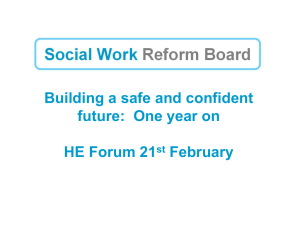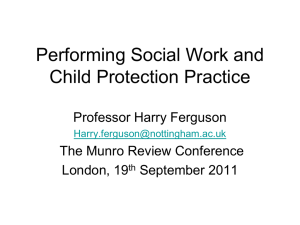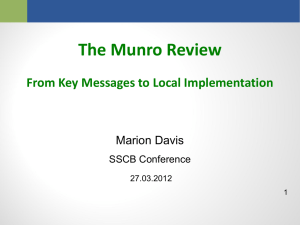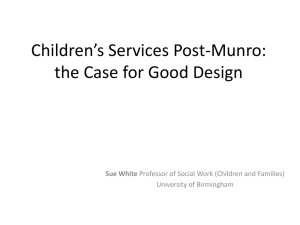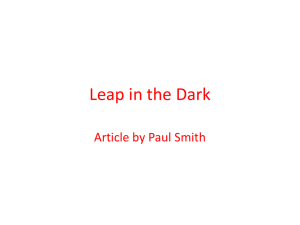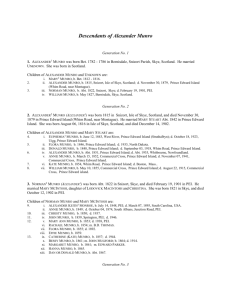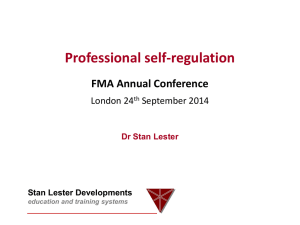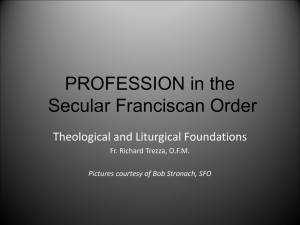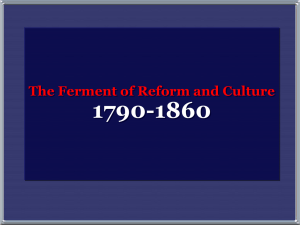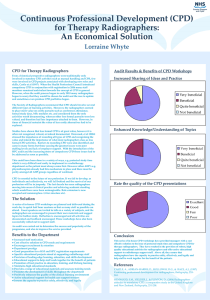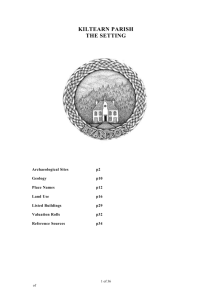Emerging themes and issues from the ongoing work
advertisement
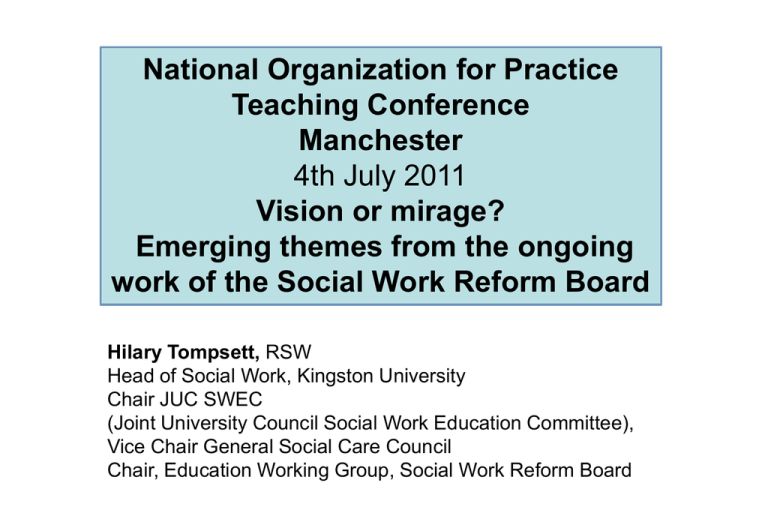
National Organization for Practice Teaching Conference Manchester 4th July 2011 Vision or mirage? Emerging themes from the ongoing work of the Social Work Reform Board Hilary Tompsett, RSW Head of Social Work, Kingston University Chair JUC SWEC (Joint University Council Social Work Education Committee), Vice Chair General Social Care Council Chair, Education Working Group, Social Work Reform Board “When you're weary Feeling small When tears are in your eyes I will dry them all I'm on your side When times get rough And friends just can't be found Like a bridge over troubled water…..” Who will be there for stand up for Social Work? Key Questions for today • In the current context, where are developments in the reform of the social work profession going? • What will be the impact of the ‘troubled water’ - financial cuts, latest reviews and an uncertain future? • Will the reforms proposed solve the problems the social work taskforce were addressing? • What changes are actually proposed? • How will all this affect you? • What influence can you have? Outline of presentation • Brief review of the Social Work Reformsbackground, progress and next steps planned • Consideration of emerging proposals, the One Year On Report, and the changing landscape • Recent events and reports (Munro), current issues, and direction of the moment • Finally - what part can we play in influencing the SW reforms and the future? – risks and opportunities. The Social Care Workforce and Carersfocus on Social Work profession (and 15,000 students) 6,000,000 Context and reasons for reform 2008-10 • Child fatalities and service concerns: Death of Baby Peter Connolly (2007) reported Autumn 2008 Practitioners: support in the workplace not always there to enable them to do a good job • Concerns about social work education expressed by: Employers: variability in social work graduates (employability?) and some courses HEIs: variability in employer engagement with initial social work education Students: difficulties in ensuring “statutory placements” - resulting in limited experiences Newly qualified social workers: feeling variably prepared for the jobs they’re expected to do – expectations high • Profession does not have a voice and is misunderstood • Whole system of reform is needed - “nuts and bolts review”. Comments on the profession and social work education at the time • “Why are we where we are now?” (Barry Sheerman, Chair, House of Commons Select Committee 2009) • Social work agencies don’t want to provide placements: Teachers don’t say this (Sheerman 2009) • Why is there no consensus on PQ? “…Sounds like a recipe for not getting a coherent profession” (Fiona Mactaggart, MP, Select Committee 2009) • “Social Workers can be supervised by a non-Social Worker? Medics would never agree to that” (Vice Chancellor, University of X, UUK Seminar on Social Work Education 21st May, 2009) Summary of progress so far.. • Jan 2010: Social Work Reform Board (SWRB) set up - chaired by Moira Gibb, with 20 representatives of stakeholder organisations after SWTF Report (Dec 2009) • March 2010: (Labour) Government Implementation plan - a clear “route map” (phased, with milestones): “A ten year commitment with concerted action over the next 5 years in particular” - short term action “right now”; £200 million for 2010/11 and £48 million capital funding promised… • June 2010: £23 million soc work improvement fund released, but other funds “to be reviewed”… • Autumn 2010: working actively to explore ideas, feasibility and develop evidenced options papers for consultation with sector • Dec 2010 ‘One Year On Report’ - Consultation ended 31.3.11. Employers ADASS ADCS CAFCASS Children England LGA LGID LGE Mind NHS Confederation SOLACE Government BIS DfE DH Educators Association of SW Professors SWAP JUC-SWEC Universities UK Professional Regulators GSCC HPC Profession Aspect BASW College of Social Work Unison Service users A National Voice Princess Royal Trust for Carers Shaping Our Lives Delivery orgs CQC CWDC HEFCE Ofsted QAA SCIE Skills for Care Employers’ Reference Group Social Workers’ Reference Group Career development working group Service users and carers Education working group Assessed & Supported Year in Employment Licence to practise Career structure Frontline Managers CPD Calibre of entrants Curriculum Education regulation Practice learning Professional standards Employers’ standard Working group Employers’ standards Supervision Supply & demand Workloads Partnerships The National Reform Programme recommended by the Social Work Task Force 2009 A Phased Approach to Reform • Clear relationship to standards informing education, employment etc A Clear Career Structure with Clear Expectations at Key Points ADVANCED PROFESSIONAL PRACTICE EDUCATOR SOCIAL WORK MANAGER FURTHER SPECIALIST STANDARDS INCLUDING: - CHILD PROTECTION - MENTAL HEALTH SENIOR LICENSED SOCIAL WORKER - SAFEGUARDING LICENSED SOCIAL WORKER Assessment ‘PROBATIONARY’ SOCIAL WORKER * * Graduate Social Worker completing an assessed first year in employment Graduation SOCIAL WORK STUDENT Entry criteria “A clear career structure, with key expectations at key points” Building a safe, confident future, SWTF Continuum of professional development Skilled, flexible professionals, able to respond to change. à Novice Advanced beginner People meeting entry criteria, including: Social Work Students Entrant - graduate entrants career changers school leavers apprentices social care workers foundation degree - Bachelors degree - Masters degree Competent Graduates - NQSW/ AYE Different specialisms à Different settings à Different roles Proficient Expert Social Workers Over time developing proficiency, expertise, and specialisms through academic (Masters/Doctorate) and practice routes (ASWP, AMHP, specialist qualifications and practice) Developing knowledge, skills, analytical and critical thinking, research mindedness. Increasing and deepening confidence, competence, specialist knowledge and skills, active research, leadership, management, practice education. CPD throughout a practitioners career; formal study, supervision, reflection on practice, in-house training, action learning, and practitioner researcher. Building a Safe and Confident Future: One Year On – Anniversary Report and first 5 reforms • An overarching professional standards framework (Professional Capabilities Framework, PCF) • Standards for Employers and Supervision Framework • Principles to underpin a CPD framework • Proposed requirements for social work education • Proposals for effective partnership (SWRB, 2010) Proposals to be published in the summer: Assessed and supported year in employment & Supply and demand model Professional capabilities framework • Aim is to provide a single comprehensive set of expectations of social workers at each stage of their career • Framework proposes nine capabilities, relevant regardless of level of experience • The PCF will link to: •Entry requirements, levels of placement, initial qualification •ASYE and CPD •Performance appraisal/pay and grading structures • Forms the main stages of national social work career structure • Capabilities agreed, elements under development Standards for employers and supervision framework • Sets out the support social workers should expect from employers • Establishes clear national requirements for supervision • Responsibility of employers to • put in place conditions in which social workers can work confidently and competently to improve outcomes • provide a suitable working environment with manageable work loads, regular high quality supervision, access to CPD and supportive management. What are the eight standards? • Social work accountability framework • Effective workforce planning • Transparent systems for workload management • Tools and resources for effective practice, minimising risk • Regular and appropriate supervision • Opportunities for CPD • Support professional registration • Effective partnerships for social work education New coherent and effective CPD framework • Simple, accessible, portable • Based on PCF to provide consistent/standardised learning objectives • A hybrid approach with an academic core and non academic learning from range of activities (accredited and non-accredited) • National recording system through performance appraisal • Opens up new thinking about responsibility and entitlement • Four principles unpin the proposals – for further discussion What are the four principles? Continuing Professional Development should: • Support social workers to maintain and develop minimum standards for re-registration • Encourage and motive social workers to improve practice through a wide range of learning opportunities, based on analysis of individual needs, ambition, career stage and learning style • Be underpinned by annual appraisal cycle and recording • Be simple to access, value for money and with opportunities for qualification and accreditation Improving the quality and consistency of the social work degree • Suite of proposals to improve the learning experiences of students and result in graduates better prepared to meet the demands and complexity of social work – Improving Calibre of entrants – guidance spring/summer 2011 – New arrangements for Practice Learning – guidance spring/summer 2011 – Continuing work on content and delivery of the Curriculum – New Curriculum Framework based on the PCF and guidance ready for consultation by Sept 2011, published April 2012 /adopted Sept 2013 Proposals for calibre of entrants • • • Written test for all Individual interview Group exercises • • • Agreed UCAS/A’ level points English language assessment Basic skills; English, Maths and IT • Continuing involvement of employers and people who use services Proposals for new practice learning arrangements • 2 placements: 1st 70 days and 2nd 100 days – across the country • 30 days to be used flexibly for skills development • Practice learning curriculum including statutory interventions for final placement • All students to be assessed by qualified and experienced social workers with Practice Educator standards Effective partnership working • A partnership framework between employers and educators across whole spectrum of education and professional development • Practice placements • ASYE • CPD • Supply & demand • Aim is to build on existing partnerships - local, flexible and diverse • Able to respond to future change • Introduction of formal written agreements What next? • Test sites have been trying out proposals • Views being collated on proposals: will they improve learning and/or practice experience of social workers at all stages of their career, considering impact of funding constraints? Report on Feedback in July • SWRB hope to transfer ownership of the PCF, curriculum guidance for initial training, CPD framework to the College of Social Work (standards); the Health Professions Council (regulator) Current/recent events impacting on the social work reform programme • Government, policy and priorities: deregulation and localization, DH vision for Adult Care, personalization, ‘Big Society’, volunteers, new ways of working… • Munro Review - Announced 10th June 2010: “..will build on the work of the Social Work Taskforce though the review may refine the future direction of this work” (Gove 2010). Reports: Oct 2010 “thinkpiece”, Feb 2011 Interim, Apri 2011 Final • Developing role for new College of Social Work: Interim Chairs/Board appointed: interest in PCF, ASYE sign off, CPD and Practice Learning funding – high expectations, convergence with BASW? • Spending cuts, reduced HE funding, bursary review • Health and Social Care Bill: a new regulator: transfer of functions from GSCC to HPC (HCPC) (DH 2011) The current landscape The future landscape? So what does the future look like to you and how will you respond? • A vision of hope, integration and planning? Re-professionalization of social work, a strong voice for social work, higher levels of satisfaction for social workers, better services for service users and carers… or • A mirage – with no certainties and all illusion? Social worker posts disappear, Social work fees go up, Bursaries removed after consultation due to lack of response, SW student applications down…. Bands of “volunteers” are recruited (Loughton, 2010) to support families and protect children Social workers lose interest in the Reforms – they are seen as irrelevant in the current context A profession in crisis or facing an important opportunity? “ ..A watershed moment for social work- and one that must be seized”. (Balls et al, 2009) “Stumbling towards oblivion or discovering new horizons?” (Dominelli 1996) “The work of the Social Work Taskforce and the Social Work Reform Board are key to improving social work. The newly formed College of Social Work will play a central role in developing the profession’s ability to improve its level of expertise” (Munro, 2011, p 133) The Munro Review was to consider… “..how social workers and all those involved in child protection can be better helped to handle uncertainty – how they can be assisted in making appropriate evidence-based assessments and interventions that will be more likely to protect vulnerable children” (1.42) “..why previous reforms to the performance and accountability framework have not secured a culture..that sufficiently promotes learning and development..” (2.46) “… the need for a practice and policy framework which acknowledges the complexity of the social work task, the emotional and intellectual demands on individuals and the central importance of critical reflection” (3.7) October 2010 First Report, January 2011 Interim Report, April 2011 “Final Report with solutions”! (Gove, 2010) Emerging from Interim Report (2011).. • Principles (p 19): A strong child protection system is… Multi professional, multi-agency, requiring all who work with children, young people and families to consider the effectiveness of their work; Child-centred; Sufficiently flexible, with space for professional judgement, to meet variety of need, complexity, uncertainty and risk; Learning and adaptive, driven by knowledge of theory and research • Shared learning & accountability (ch 5) will include: Multi agency training and learning; Methods of learning from practice through case reviews - a multiagency learning process; A systems approach to learning from Serious Case Reviews; Revising Working Together to Safeguard Children (2010) Munro Final Report recommended.. • SWRB’s PCF to “incorporate capabilities for child and family Social Work and explicitly inform social work qualification training, postgraduate professional development and performance appraisal” (6) • Employers and HEIs to work together to prepare students for child protection challenges - high quality practice placements, approved practice settings, teaching organizations, student units (12) • Encourage professional judgement, less prescription for national approaches, IT, or assessment forms (1) and more support for “evidence based ways of working” (13) • Government to appoint Chief Social Worker for social work practice advice (15) But could this mean?.. • Munro report promotes children’s social work • All students have to have a final child care placement • Adults and mental health social work decline • Children’s social workers feel strengthened to assert themselves, but are fewer in number and hold more critical roles/complex cases • College is supported by some social workers.. BASW/College difficulties alienates politicians, social workers, service users and carers, and the public • Fragmentation of the profession looms… Or will this happen? • Social Workers respond to the One Year On Reform Proposals, Munro Review & the bursary consultations, social work seen as a strategically important profession for these straitened times, bursaries are maintained for Social Workers • Registered social workers celebrate the establishment of a professional College, join with enthusiasm, and share good practice with each other: BASW and the College do merge.. • Munro inspires all Social Workers & restores confidence in professional judgement - numbers of professional social worker posts may go down, but quality of work and pride increases - a chief Social Worker champions all social work? • Reform programme is adopted by the Social Work community who make it work. Because there is a future that we can create Social Work has always been a dynamic organic profession, adapting to new circumstances and contexts. As social workers, we can: • remember why we came into social work: principles of social justice (Ferguson, 2007) and “the relationship at the heart/centre of social work practice” (Wilson, Ruch, Lymbery & Cooper, 2008) • respond to the consultations/testing of Reform proposals • support and join the voice for the profession (College). Noone forgets a good social worker, practice educator or manager – be one, and be proud of the profession you belong to. Together.. We can be the bridge over troubled water “I'll take your part When darkness comes And pain is all around Like a bridge over troubled water I will lay me down Like a bridge over troubled water I will lay me down” (Garfunkel, 1970) References 1 Balls Ed, Burnham Andy, Lammy David (2009) Letter to Social Workers Dec 1st 2009 – ‘Building a safe, confident future’ (DCSF/DH/BIS) DH (2011) Health and Social Care Bill London: HMSO Dominelli L (1996) Deprofessionalizing Social Work: anti-oppressive practice, competencies and post-modernism, British Journal of Social Work, Vol 26, Issue 2, pp 153-175 Ferguson Harry, (2007) Reclaiming Social Work : Challenging NeoLiberalism and Promoting Social Justice, London: Sage Gibb Moira, (2009) Facing the Task Interim Report of the Social Work Taskforce, July 2009 Gibb Moira (2009) ‘Building a safe, confident future ; Report of the Social Work Task Force (DCSF publication) Gove Michael (2010) Letter to Professor Eileen Munro re Munro Review of Child Protection, 10th June 2010 House of Commons Select Committee Proceedings (2009), Children and Families Social Work, London HMSO HM Government (2010) Building a Safe and Confident Future: Implementing the recommendations of the Social Work Task Force References 2 Loughton, Tim (2010) Letter to Moira Gibb, Chair SW Reform Board re the Munro Review of Child Protection, 10th June 2010 Munro E (2010) The Munro Review of Child Protection – Part one Systems Analysis Munro E (2011) The Munro Review of Child Protection – Interim Report : The Child’s Journey Munro E (2011) The Munro Review of Child Protection – Final Report : A child-centred system all available at: http://www.education.gov.uk/munroreview/ SWRB (2010) Building a safe and confident future: One Year on @www.education.gov.uk/swrb Wilson K, Ruch G, Lymbery M and Cooper A (2008) Valuepack:Social Work: An Introduction to Contemporary Practice, London: Longman Social Work Reform Board – information available at: http://www.dcsf.gov.uk/swrb/ College of Social Work – information available at: www.collegeofsocialwork.org Enquiries: information.swrb@education.gsi.gov.uk
